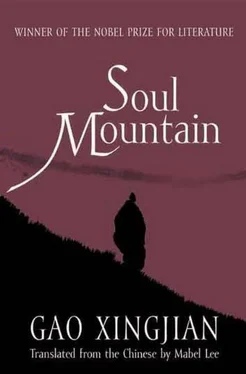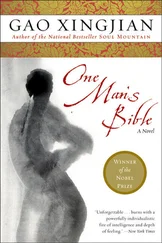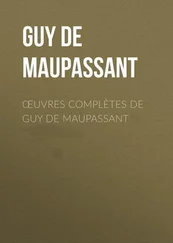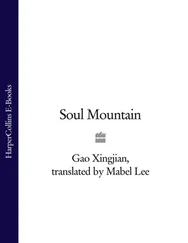Within a half-closed door is a damp courtyard, overgrown with weeds, desolate and lonely, with piles of rubble in the corners. You recall the back courtyard with the crumbling wall of your childhood home. You were afraid but it had a fascination for you, for the fox fairies of story books came from there. After school, without fail, you would go off alone with some trepidation to have a look. You never saw a fox fairy but that feeling of mystery always lingered in your childhood memories. There is an old stone bench riddled with cracks and a well which is probably dry. The mid-autumn wind blows through the dry yellow weeds in the rubble and the sun is very bright. These homes with their courtyard doors shut tight all have their histories which are all like ancient stories. In winter, the north wind is howling through the lane, you are wearing new warm padded cloth shoes and are with other children stamping your feet by the wall. You can remember the words of the ditty:
In moonlight thick as soup
I ride out to burn incense
For Luo Dajie who burnt to death
For Dou Sanniang who died in a rage
Sanniang picked beans
But the pods were empty
She married Master Ji
But Master Ji was short
So she married a crab
The crab crossed a ditch
Trod on an eel
The eel complained
It complained to a monk
The monk said a prayer
A prayer to Guanyin
So Guanyin pissed
The piss hit my son
His belly hurt
So I got an exorcist to dance
The dance didn’t work
But still cost heaps of money
Pale withered weeds and lush green new sprouts in the roof-tiles quiver in the wind. How long is it since you’ve seen grass growing in roof-tiles? Your bare feet patter on the black cobblestone street with its deep single-wheel rut, you’ve run out of your childhood back into the present. The bare feet, the dirty black feet, patter right there in front of your eyes. It doesn’t matter if you’ve never run barefoot, what is crucial is this image in your mind.
After a while you find your way out of the little lanes and make it back on the highway. This is where the bus from the county town turns around to go back. There’s a bus station by the road with a ticket window and some benches inside, this is where you got off the bus earlier on. Diagonally across the road is an inn — a row of single-storey rooms — and the whitewashed brick wall has a sign “Good Rooms Within”. It looks clean and you have to find somewhere to stay, so you go in. An old attendant is sweeping the corridor and you ask her if there’s a room. She says yes. You ask her how much further is it to Lingshan. She gives you a cold look, this is a state-run inn, she’s on a monthly state award wage and isn’t generous with words.
“Number two,” she says pointing with the broom handle to a room with the door open. You take your luggage in and notice there are two beds. On one there’s someone lying on his back, one leg crossed over the other, with a copy of Unofficial Record of the Flying Fox in his hands. The title is written on the brown paper cover of the book, apparently on loan from a bookstall. You greet him and he puts down the book to give a friendly nod.
“Hello.”
“Staying here?”
“Yes.”
“Have a cigarette.” He tosses you a cigarette.
“Thanks.” You sit on the empty bed opposite. It happens that he wants to chat. “How long have you been here?”
“Ten or so days.” He sits up and lights himself a cigarette.
“Here buying stock?” you ask, taking a guess.
“I’m here for timber.”
“Is it easy getting timber here?”
“Have you got a quota?” he asks instead, starting to become interested.
“What quota?”
“A state-plan quota, of course.”
“No.”
“Then it’s not easy to get.” He lies down again.
“Is there a timber shortage even in this forest region?”
“There’s timber around but prices are different.” He can’t be bothered, he can tell you’re not in the game.
“Are you waiting for cheaper prices?”
“Yes,” he responds indifferently, taking up his book again to read.
“You stock buyers really get to know about a lot of things.” You have to flatter him so that you can ask him some questions.
“Not really.” He becomes modest.
“The place Lingshan, do you know how to get there?”
He doesn’t reply so you can only say you’ve come to do some sightseeing and is there anywhere worth seeing.
“There’s a pavilion by the river. If you sit there you’ll get a good view of the other side of the river.”
“Enjoy your rest!” you say for want of something to say.
You leave your bags, find the attendant to register and set off. The wharf is at the end of the highway. The steps, made of long slabs of rock, go down steeply for more than ten metres and moored there are several black canopy boats with their bamboo poles up. The river isn’t wide but the riverbed is, clearly it’s not the rainy season. There is a boat on the opposite bank and people are getting on and getting off. The people on the stone steps are all waiting for it to come across.
Up from the wharf, on the embankment, there is a pavilion with upturned eaves and curling corners. The outside is lined with empty baskets and resting inside are farmers from the other side who were here for the market and have sold all of their goods. They are talking loudly and it sounds like the language used in the short stories of the Song Dynasty. The pavilion has been painted recently and under the eaves the dragon and phoenix design has been repainted and the two principal columns at the front are inscribed with the couplet:
Sitting at rest know not to discuss the shortcomings of other people
Setting out on a journey fully appreciate the beauty of the dragon river
You go around to look at the two columns at the back. These words are written there:
On departing do not forget to heed the duckweed waters
Turn back to gaze in wonder at Lingshan amongst the phoenixes
You’re intrigued. The boat is probably about to arrive as the people resting and cooling off have got up and are rushing to shoulder their carrying poles. Only an old man is left sitting in the pavilion.
“Venerable elder, may I ask if these couplets…”
“Are you asking about the couplets on the principal columns?” the old man corrects me.
“Yes, venerable master, might I ask who wrote the couplets on the principal columns?” you say with added reverence.
“The scholar Mr Chen Xianning!” His mouth opens wide, revealing sparse black teeth, as he enunciates each of the words with great precision.
“I don’t know of him.” You’d best be frank about your ignorance. “At which university does this gentleman teach?”
“People like you wouldn’t know, of course. He lived more than a thousand years ago.” The old man is contemptuous.
“Please don’t make fun of me, venerable elder,” you say, trying to stop him ridiculing you.
“You don’t need glasses, can’t you see?” he says pointing up to the beam at the top of the columns.
You look up and see on the beam which hasn’t been repainted, these words written in vermilion:
Erected during the Great Song Dynasty in the first month of spring in the tenth year of the Shaoxing reign period and repaired during the Great Qing Dynasty on the twenty-ninth day of the third month of the nineteenth year of the Qianlong reign period.
I set out from the hostel of the nature reserve and go back to the house of the Qiang retired village head. A big padlock is hanging on his door. This is the third time I’ve been back but again he’s not there. It seems that this door which can lead me into that mystical world has closed for me.
Читать дальше
Конец ознакомительного отрывка
Купить книгу












